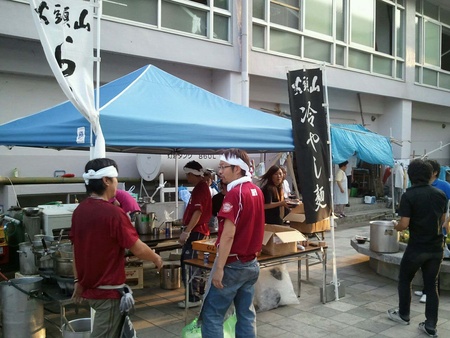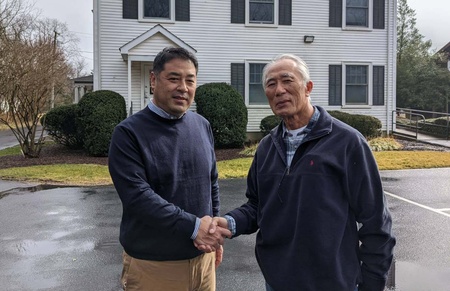The Great East Japan Earthquake was a turning point
Jun Yoneda is the CEO of Food's Style USA, which distributes Santouka Ramen in the United States. I remember that I received a sudden contact from him around spring 2020. He had read an article I had written in Discover Nikkei about a Japanese vegetable farm in Southern California and had asked for the farm's contact information. This led to us interacting on social media. Then, in February 2021, I saw a post in which Yoneda's company was taking over Suzuki Farm's business in Delaware on the East Coast, and I became interested again in what he was planning to do in America. Then, one morning in February, I was able to interview Yoneda at Santouka's Boston store via Zoom.
Yoneda's previous job was as a representative of a Japanese professional baseball team. He served as the representative of the Rakuten Eagles, based in Sendai, for eight years from 2004. During that time, the Great East Japan Earthquake occurred. "The earthquake was such a big shock to me that it became a turning point for me. Some of my acquaintances' relatives died, and I myself rushed to the disaster area to volunteer. I was distributing Eagles goods, and the president of Santouka (a ramen shop) was providing ramen to the disaster victims there. At that time, I realized how much a bowl of ramen can give people energy. I felt like I was reminded of the importance of eating."

Yoneda, who became independent at the age of 50, decided to venture into the food industry, and chose America as the stage for his venture. "I had connections with Major League Baseball since my days as a professional baseball player, and I had been to America many times. I sensed the vastness of this country and the market potential, so I obtained the rights to open Santoka stores in America and Europe, and opened my first store in Bellevue, a suburb of Seattle." He then went on to Seattle, Boston, and Virginia, and currently operates five stores.
Buoyed by the ramen boom, Santoka's American street stores were steadily increasing sales, but in March 2020 they were hit hard by the COVID-19 pandemic.
"Our restaurant business is based on dine-in customers, so the lockdown was a huge blow. We knew we had no choice but to strengthen our take-out and delivery services, so we developed and quickly introduced an online ordering system via a smartphone app. We saw how effective this system was, as it even allows contactless payment. We also started selling online items such as the aprons worn by our staff and rice bowls with our logo on them."
In addition, the company also had a membership system that allowed customers to register and receive rewards, which proved to be a success. Thanks to this system, the company is able to continue to connect with customers who are fans of Santouka ramen. Yoneda says that even after the lockdown is lifted, the situation will not completely return to the way it was before the pandemic, and that he will continue to focus on these initiatives.
The spending power of the American market
Now, let's talk about Japanese vegetables. Originally, when spreading Japanese food culture in America, Yoneda had his sights set on expanding the use of Japanese vegetables, which are the ingredients of Japanese food.
"I want to go upstream and spread the word about Japanese food from the perspective of a producer. So, even before the pandemic, I visited 10 Japanese vegetable farms across the United States. As a result, I was given the opportunity to work with Suzuki Farm through business succession. Suzuki Farm cultivates around 30 types of vegetables on a site of 58 acres, about the size of five Tokyo Domes. In fact, Kobayashi, the manager of Santoka's Bellevue store, comes from an apple farm in Nagano Prefecture. He raised his hand and has already started working at Suzuki Farm and is based there full-time (laughs)."
Suzuki Farm's Japanese vegetable brand has made inroads on the East Coast, and Yoneda's plan is to sell the produce more widely to consumers online.
"Because we are a farm on the East Coast, our sales are limited to certain areas on the east side, but we have Santouka stores in Boston and Virginia, so we are able to sell to customers at those stores. In order to spread the word about our ingredients, we will also be providing recipes using these vegetables."
Beyond that plan, Yoneda has an ambitious and attractive vision for the future, which involves opening Japanese vegetable farms across the United States, possibly through a business transfer, and selling online not only on the East Coast but also in a wider area.
At the age of 50, Yoneda left a stable job and position at a major Japanese company to enter a different industry and begin a new challenge in the United States. Seven years have passed since then. When asked how he feels about America now, he replied, "The consumer power of the people of America is greater than you would imagine. After all, America is a country with a GDP four times that of Japan. The consumer power of America will likely remain stable in the future, and as long as that power remains, I will continue to take on challenges."
Santoka's website: https://santouka-usa.com
Suzuki Farm website: https://stores.nihonyasai.com
© 2021 Keiko Fukuda






